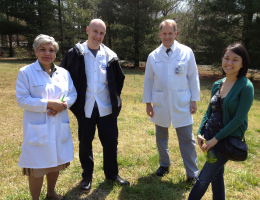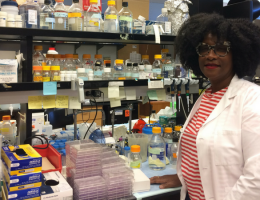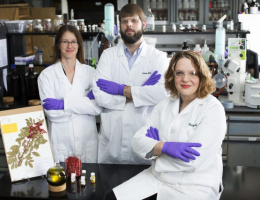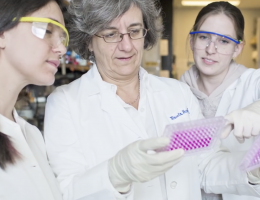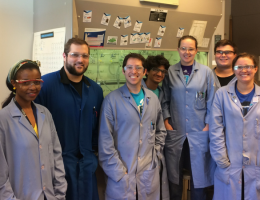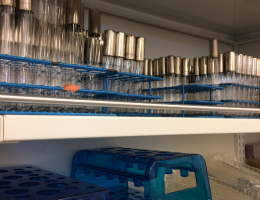Emory Healthcare is nationally recognized for compassionate patient care, leading provider skill, unmatched medical research, and its commitment to public health. Your leadership is integral to making Emory a healthy place for patients, staff and visitors, and the most sustainable choice for healthcare in the southeast.
Acknowledging the ancestral peoples and land
Emory’s Office of Sustainability Initiatives acknowledges the Muscogee (Creek) people who lived, worked, produced knowledge on, and nurtured the land where Emory’s Oxford and Atlanta campuses are now located. The Muscogee people were forcibly removed from states like Georgia and Alabama during the Trail of Tears relocation (1830-1838), a shameful part of our history when the federal government forced Indigenous peoples across the region to leave their ancestral homes. In 1836, Emory University was founded on part of this land. It is important for us to acknowledge, honor, and respect the land we now call home; to further recognize the inherent intersections between Indigenous rights, sustainability, and the environment; and to continue to strive for justice and recognition for Indigenous communities.
Read Emory’s official Land Acknowledgement and learn more here.
TAKE ACTION
- Learn how to make your work spaces more sustainable through the Green Offices and Green Labs programs.
- Make all of your events zero landfill waste and Certified Sustainable Events.
- Take your personal sustainability pledge to learn how you can positively impact the world for current and future generations.
- Have an idea for a sustainability innovation on campus? Apply for annual funding opportunities.
- Get to know your building’s Sustainability Representative, and explore ways to volunteer or get involved with sustainability at Emory.
- We are working on creating a checklist for hospital departments to get involved. If you would like to make your department sustainable, let us know!
KEEP IT SUSTAINABLE
- Recycle your cans and bottles at Emory Hospital cafes and help us achieve zero landfill waste.
- Use the green and blue bins located outside of many of our facilities. Put food in the green compost bins and everything else in the blue recycle bins.
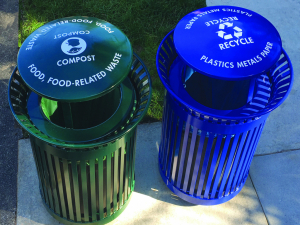
- Incorporate local and sustainable food into your diet by volunteering in an Emory Educational Garden and shopping at the Emory Farmers Market.
- Save money and improve your quality of life by switching to a sustainable commute mode, taking a shuttle, bicycling, or carpooling to and from campus.
LEARN MORE
- Know the goals of the Emory Healthcare Sustainability Council, learn about the progress we’ve made, and understand why we care about sustainability in healthcare. Let us know if you would like to get involved!
- Read the Emory Sustainability Vision and Strategic Plan, and see our progress.
- Sign up for the Office of Sustainability e-newsletter; follow us on Facebook and Instagram.
Helpful Documents and Links for Healthcare Staff
| Title | Initiative | Type | Description |
|---|---|---|---|
| Emory Healthcare Sustainability Council Mission & Goals | All Initiatives | Documents & Reports | The Emory Healthcare Sustainability Council was established in September 2009 (formerly the Sustainability in Health Sciences Task Force) to develop a set of recommendations to guide senior administrators in setting goals and year-to-year strategies that will improve current practices or implement new best practices in sustainability for the Woodruff Health Sciences Center. |
| Emory University STARS Report | All Initiatives | Documents & Reports | The Sustainability Tracking, Assessment & Rating System (STARS®) is a transparent, self-reporting framework for colleges and universities to gauge relative progress toward sustainability. STARS was developed by AASHE with broad participation from the higher education community. |
| Emory’s 2023 Climate Action Plan | Climate Solutions | Documents & Reports | Emory's most recent climate action plan offers recommendations to guide Emory on its path to net neutrality by 2050. |
| Emory’s Climate Commitments: Summary and Implementation | Climate Solutions | Documents & Reports | This memorandum summarizes the commitments that Emory made in 2021, Emory’s history of implementation, the next steps for implementation, and relevant resources and contacts for each commitment. |
| FY2021 Greenhouse Gas Emissions Inventory Full Report | Buildings, Climate Solutions, Energy, Transportation, Waste, Water | Documents & Reports | Emory regularly evaluates its greenhouse gas (GHG) emissions, or carbon footprint, in order to monitor its efforts to reduce emissions to net-zero by 2050 through strategies that entail targeted mitigation, behavior change, clean and renewable energy sources, and new innovations. GHG emissions reporting began in FY10, with 2005 as the original baseline year, and subsequent inventories have been conducted in 2013, 2014, 2016, 2019, and 2021. |
| Green Labs Certification Checklist | Climate Solutions, Energy, Purchasing, Transportation, Waste, Water | Forms | Learn what sustainable actions your lab can adopt, and tell us what you’re already doing, by filling out the Green Labs at Emory Checklist and consulting the companion Green Labs at Emory Guidance Document. |
| Green Labs Certification Guidance Document | Climate Solutions, Energy, Purchasing, Transportation, Waste, Water | Guides | Consulting this companion Green Labs at Emory Guidance Document when filling out your Green Labs Checklist for certification. This Guidance Document provides instruction for how to implement each action and justification for why each action is important. |
| Green Offices at Emory Certification Checklist | Buildings, Climate Solutions, Energy, Food & Dining, Purchasing, Transportation, Waste, Water | Forms | This document is only for your reference. Please fill out the Green Office checklist on Microsoft Forms. |
| Healthcare Greenhouse Gas Report | Climate Solutions, Wellbeing | Documents & Reports | If the global healthcare sector were a country, it would be the fifth-largest greenhouse gas emitter on the planet, a new international report shows. This is one of the major findings from the 48-page report by the nongovernmental organization Health Care Without Harm in collaboration with technical advisor Arup. |
| Healthcare Sustainability: Why We Care | All Initiatives | Documents & Reports | Emory University values sustainability in our Healthcare. Use this document to see our goals, accomplishments, and rationals. |
| State of Sustainability in Emory Healthcare | All Initiatives | Documents & Reports | Emory Healthcare sustainability goals and accomplishments as of January 2018 |
| Sustainable Healthcare at Emory University by Lauren Balotin | Wellbeing | Documents & Reports | Learn about initiatives within Emory Healthcare to address sustainability concerns, including waste reduction, energy & water conservation, sustainable hospital food, and the Sustainability in Health Sciences Task Force. [Keywords: sustainable healthcare at Emory, hospital recycling, hospital food] |
| Zero Waste Ambassadors Charge Fall 2022- Spring 2023 | Waste | Documents & Reports | The ZWAs are a group of student, faculty, and staff volunteers, who are actively willing to champion waste management and reduction in all areas of the Emory experience. They strive to promote a culture at Emory that prioritizes reducing and diverting waste in all decisions that we make as individuals and as a community. You can read more about specific goals of the program this year in the charge. |


